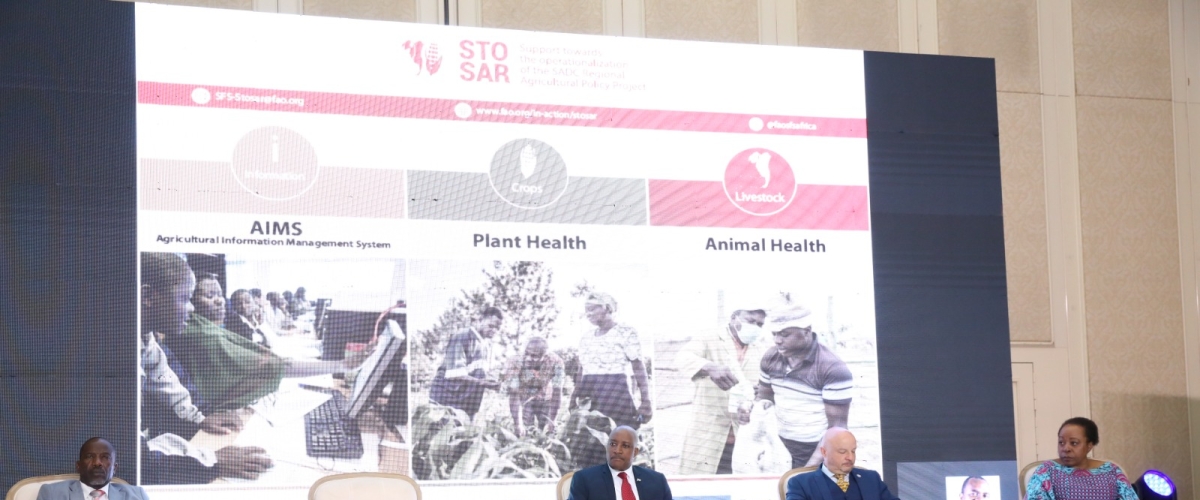
By Nicholas Mwambazi
Agriculture plays a crucial role in the economic development and food security of the Southern African Development Community (SADC) region. However, the sector faces several challenges, including climate change, soil degradation, and limited access to markets, technology, and information.
Access to timely and accurate information is critical for enabling farmers and policymakers to make informed decisions that promote sustainable agriculture and food security.
For this reason, the European Union (EU), working with the Food and Agriculture Organization (FAO) of the United Nations (UN), supported the SADC member states in implementing the SADC regional agriculture policy project known as Support Towards the Operationalization of SADC Region policy (STOSAR).
Minister of Agriculture for Botswana, Fidelis Molao, commended the European Union and FAO for helping the SADC region develop Agricultural Information Management Systems (AIMS) for data-driven decision-making, tackling key transboundary animal diseases and crops to facilitate market and trade.
The three-year ‟Support towards Operationalization of the SADC Regional Agricultural Policy” (STOSAR) has three components being implemented by the SADC Secretariat and FAO. The components are enhancing information on agricultural production, sustainability, and competitiveness for evidence-based decision-making; improving access to markets through implementation of plant and animal pest and disease control strategies at the regional level; and facilitating the implementation of some components of the Regional Food and Nutrition Security Strategy (FNSS). The latter component is being implemented directly by the SADC secretariat.
The project aims to strengthen regional integration, promote sustainable agricultural and socio-economic growth, improve access to markets, facilitate trade, and enhance food and nutrition security within the SADC region.
By investing in domestic agri-food systems, which promote economic growth and sustainable food production, member States of SADC are leveraging the benefits of regional value chains, access to international markets, and pooling of resources to achieve economies of scale.
To facilitate regional cooperation and integration, SADC has developed a Regional Agricultural Policy (RAP) that provides a framework of common objectives designed to harmonize and create synergies between the agricultural sectors of its Member States, strengthening regional integration, sustainable agricultural growth, and socio-economic development.
The SADC Council of Ministers approved the SADC Regional Agricultural Policy (RAP) and the SADC Regional Agricultural Policy Investment Plan (RAIP) in June 2013 and July 2016, respectively.
The RAIP, which aims to operationalize the RAP, was prepared in the context of the Comprehensive African Agriculture Development Programme (CAADP), which was established in Maputo in 2003 as a Pan-African policy framework to transform agriculture, create wealth, improve food security, and nutrition, and promote inclusive economic growth.
This project forms part of the 11th Electronic Data Interchange (EDF) Regional Indicative Programme (RIP) identified under the SADC region envelope in line with the 11th EDF 2014 - 2020 Regional Indicative Programme for Eastern Africa, Southern Africa, and the Indian Ocean. The overall objective of this action is to accelerate progress toward the implementation of SADC regional integration.
The EU and SADC Secretariat identified FAO as the lead implementing agency for the two components of the Support Towards the Operationalization of the SADC Regional Agricultural Policy Project (STOSAR).
The Food and Agriculture Organization (FAO) of the United Nations (FAO) Sub-Regional Coordinator for Southern Africa, Patrice Talla, urged SADC member states to embrace innovative approaches to managing transboundary pests and diseases, which pose food safety risks that undermine international trade.
Speaking at the ‘Support Towards the Operationalization of the SADC Regional Agricultural Policy' (STOSAR) end-of-project workshop, Talla said, “Working in collaboration with the Centres of Excellence, the STOSAR project has capacitated SADC countries to develop the adoption of international standards such as Commodity-based trade, that has enabled some SADC countries get access to international markets by ensuring compliance with the requirements of importing countries.”
The implementation of the SADC Regional Agricultural Policy through the STOSAR project has led to deeper regional integration by harmonizing agricultural strategies, promoting trade, and fostering collaboration among SADC member states, contributing to a more resilient and prosperous agricultural sector.
SADC Deputy Executive Secretary for Regional Integration Angele Makombo N’tumba highlighted STOSAR’s successes, stating that “The implementation of the SADC Regional Agricultural Policy has already yielded significant achievements and by enhancing market access and tackling transboundary pests and diseases, the project has ensured the resilience and competitiveness of our shared agricultural sector within and beyond the SADC region.”
Officially opening the STOSAR end of project workshop, the Botswana Minister of Agriculture, Fidelis Molao commended the project for opening market access for the country.
Botswana is currently negotiating to export fresh citrus fruits to key markets such as the European Union, the United States of America, India, and China. This initiative follows a comprehensive countrywide surveillance for citrus black spots, which has led to the establishment of pest-free areas.
Advanced plans are underway by the European Union to support the second phase of the STOSAR project and build on the progress and gains achieved by the STOSAR project.
Deputy Head of Cooperation Delegation of the European Union to the Republic of Botswana and SADC Jose Becerra reiterated the EU’s continued support to the SADC Regional Indicative Strategic Development Plan (RISDP) 2020-2030.
“STOSAR II will contribute towards addressing industrial development and market integration through a transformed agricultural sector that practices sustainable management of the environment and its natural resources. It would support value chain actors and improve the policy environment to facilitate their access to global markets with high-quality and safe products in line with the principles and approaches to agroecology,” said Becerra.
To emphasize the significance of strategic partnerships and innovation, a Business Expo was held concurrently with the STOSAR end of project workshop, where 12 exhibitors presented their products and services aimed at promoting sustainable agrifood systems across the SADC region.
The continued implementation of the SADC Regional Agricultural Policy promises to enhance and capitalise on trade opportunities in regional and international markets, ensuring food and nutrition security for all SADC member states.
The author is an ICT Officer at the Ministry of Agriculture





